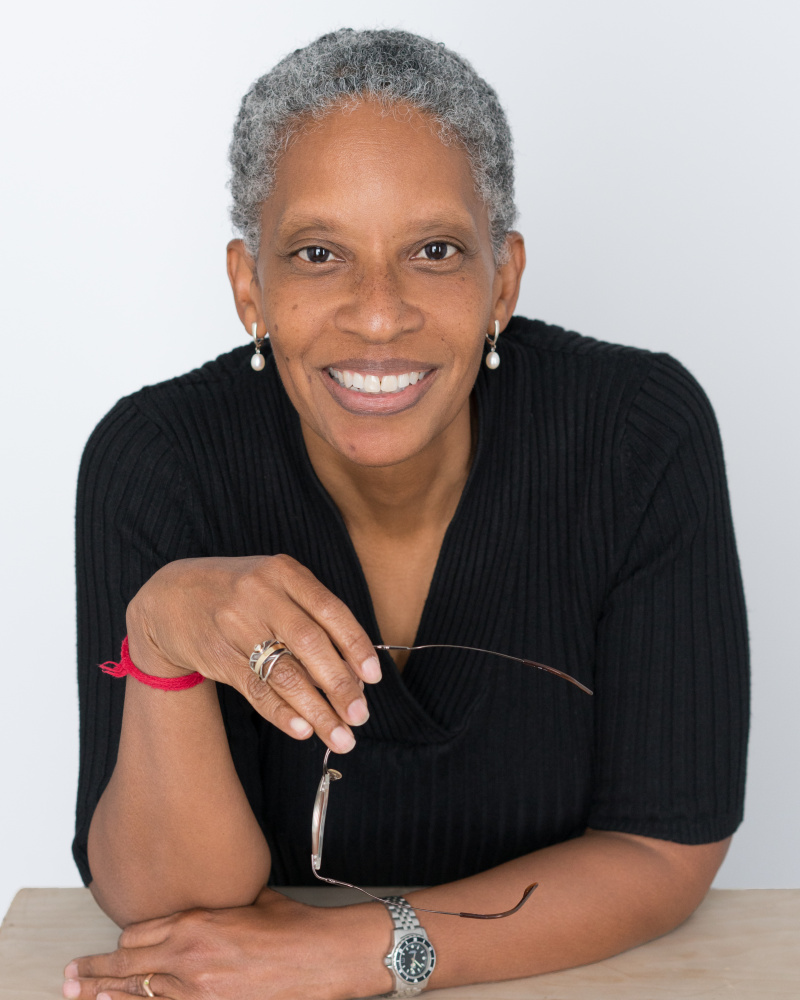
Pamela Ayo Yetunde Oral History
→ Transcript of Pamela Ayo Yetunde’s interview.
Biography
Pamela Ayo Yetunde was born in Indianapolis in 1961. She grew up in a lower-middle class, almost all-Black neighborhood. She grew up with one younger brother and two cousins that lived nearby. Pamela’s father passed away when she was only eight years old. She attended United Methodist Church growing up and remembers going weekly. Pamela also recalls being brought up with many traditional values like reciting the Lord’s Prayer, not stealing, not lying, as well as “girl values” like being demure and modest.
She also remembers going to a local school in her younger years, but in the early 1970s, was bussed to an all-white school for a year as part of integration. However, this only went on for a year before she returned to her prior school. This was one of her earliest memories of racial issues and recalls white parents with signs protesting and wondering why white students weren’t being bussed to her neighborhood. During her high school years, Pamela experienced bussing again, but by this time, there were more Black students and also a police presence on campus to prevent riots. Despite these racial tensions, Pamela played tennis and was popular in high school.
After graduating high school, she attended Ball State University. She majored in journalism with an advertising concentration. It was during her time at Ball State that she was an R.A. and later decided to move off campus. This decision to move offsite resulted in her mother cutting off financial and emotional support. This difficulty with her mother leads her to the Bible after several years of not attending church during college. After some reading of Scripture, Pamela decided that she did not want to pursue journalism anymore but did not know what else she wanted to do. It was a History professor that led her to participating in a trip to Zimbabwe. During this trip, Pamela had a revelation about God and how she views God. Pamela finished her college degree and wanted to join the Peace Corps but did not want to be sent to South or Central America. Instead she joined Church of the Brethren Service organization and was assigned to the Netherlands for two years where she worked on nuclear disarmament, human rights, and other issues.
Afterward, Pamela returned to the United States and interned with the ACLU in Washington, D.C. She became inspired by the lawyers that she came in contact with during her internship and decided to pursue a law degree. She enrolled in law school at Indiana University. After graduating law school, she clerked in North Carolina and realized she was not well-suited to become an attorney. After clerking, she secured a temporary position as a Naturalization and Immigration Political Asylum officer. Unfortunately, this position was temporary, but Pamela remembers it fondly and thoroughly enjoyed the work.
Her cousin Roderick became ill around this time and it came to light that he was afflicted with AIDS. After this diagnosis, some relatives refused to visit him, but Pamela visited him in his final months. It was this experience that would spark her interest in counseling and hospice work. Not long after the death of Roderick, at the suggestion of Roderick’s mother, she came out to her mother, who outed her to the rest of the family. She was roundly condemned and shunned. Luckily, friends told Pamela about Glide Memorial United Methodist Church, which was her first LGBT-affirming church experience.
Around 2002, Pamela resolved to get involved with hospice training. Upon further research, Pamela found that Zen Hospice Project was the only training program in the San Francisco Bay Area that was a year long. Upon her entrance into the program, she was not very familiar with Zen or Buddhism save for a book she had received as a gift, “Touching Peace” by Vietnamese Zen Master Thich Nhat Hanh. After completing her program at Zen Hospice Project (now Zen Caregiving Project), she pursued Buddhist chaplaincy training at Sati Center for Buddhist Studies, which also lasted one year. After the Sati Center, Pamela entered Clinical Pastoral Education (CPE) at Alta Bates Summit Medical Center.
After CPE, Pamela became a hospice chaplain and worked towards her M.A. in Culture and Spirituality at Holy Names University. In 2016, she went on to receive her Th.D. in pastoral counseling from Columbia Theological Seminary.
Looking back, Pamela acknowledges that the rejection she experienced from her family gave her more freedom to do whatever she felt called to do, and greater resiliency to withstand rejection from acquaintances, colleagues, and strangers.
Pamela is also a prolific writer, having written a book on African American women and finance, a financial literacy book for youth, and a book on the spirituality of personal finance, all after her time in law school. She is also the author of books on Buddhism and womanist theology, and co-edited an anthology on being Black and Buddhist. She has also written many articles, one of which lead to an invitation to teach at United Theological Seminary of the Twin Cities. In 2020, Pamela co-founded the Center of the Heart, a wellness practice that offers spiritual and emotional healing through various services, programs, and events.
(This biographical statement written by Lynsey Allie from this interview and edited by Ayo Yetunde.)
Biography Date: January 2021
Additional Resources
Profiles:
Tags
Black | Methodist (UMC, United Methodist Church) | Buddhist | AIDS | Author/editor | Indianapolis | Indiana | San Francisco | California | Theology | Yetunde, Pamela Ayo
Citation
“Pamela Ayo Yetunde | Oral History”, LGBTQ Religious Archives Network, accessed February 26, 2026, https://lgbtqreligiousarchives.org/oral-histories/pamela-ayo-yetunde.